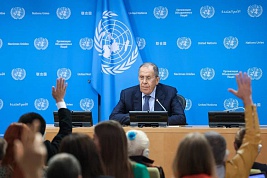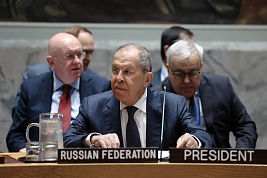Statement by the Russian Ministry of Foreign Affairs
According to reports coming in from Tbilisi, Mikhail Saakashvili has today announced a decision to "denounce the agreement on the presence of the Russian peacekeeping mission in Abkhazia and declare the Russian troops in the Abkhazian region occupier troops."
From the formal point of view the CIS Council of Heads of State decision of September 19, 2003, on the presence of the Collective Peacekeeping Force in the conflict zone in Abkhazia implies the possibility of automatic termination of this peacekeeping operation in the event of one of the parties in conflict making such a request.
Yet it would be fundamentally wrong to consider this statement of Mikhail Saakashvili in isolation from the dramatic situation that has evolved in the region as a result of the Georgian aggression against South Ossetia and the humanitarian catastrophe that has ensued.
In these conditions, the demand to end the peacekeeping operation in Abkhazia, being carried out in full conformity with the norms of international law, appears to be nothing else than an attempt to prepare the ground for a new armed adventure, this time against Abkhazia.
In this connection the Russian Federation proceeds from the following.
Firstly, the use of the CIS Collective Peacekeeping Force (CPKF) is made with the consent of not only the Georgian, but also of the Abkhaz side. This was put on a formal basis by the Moscow Agreement on the ceasefire and separation of forces of 14 May 1994 (it does not deal with ending-of-the-peacekeeping-operation matters). The CIS CHS decision on the use of the CPKF of August 22, 1994, contains a direct reference to the request from the Abkhaz side of May 15, 1994 and to the aforesaid Moscow Agreement. Taking this into account, we consider it impossible to decide the fate of the peacekeeping operation without regard to the Abkhaz side's opinion.
Secondly, the deployment of the CIS CPKF in the Georgian-Abkhaz zone of conflict has the support of the United Nations Security Council, repeatedly expressed in its resolutions, including resolution 1808 of April 15, 2008. The provisions on CIS CPKF are an integral part of the 1994 Moscow Agreement; i.e. in case of liquidation of the CPKF the entire international legal architecture of Georgian-Abkhaz settlement would collapse.
Thirdly, there is the agreement of January 6, 1995 in the form of an exchange of letters between the CIS and the United Nations on the respective roles and functions of the CPKF and the UN Observer Mission in Georgia (UNOMIG). Actually UNOMIG cannot perform its mandate without the support of the CPKF, upon which the duty is laid to ensure the security of the UNOMIG staff. The resolutions of the UN Security Council envisage a review of the mandate of UNOMIG in case of change of the mandate of the CPKF.
Thus, in case of the realization of the absurd demand of Mikhail Saakashvili to end the peacekeeping operation in Abkhazia the region risks getting bogged down even deeper in the quagmire of crisis brought on by the unhealthy ambitions of the present Georgian leadership. Such a scenario is categorically unacceptable for the peoples inhabiting the region. It is fraught with new bloodshed, with new thousands of refugees and with a widening of the humanitarian catastrophe. It appears that such a development of events would also run counter to the efforts of the members of the international community that today declare their interest in the earliest settlement of the crisis.
Guided by its international commitments and a sense of responsibility for the maintenance of peace and stability in the region, the Russian Federation will continue fulfilling its peacekeeping mission in Abkhazia and South Ossetia.
August 13, 2008


